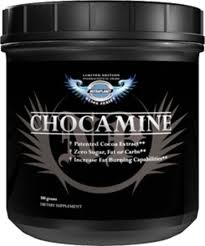Chocolate healthy and anabolic
 Have you had your flavonoids today?
Have you had your flavonoids today?
While not a question normally asked at a social gathering, flavonoids have become quite a hot topic in the media and in scientific journals.
Flavonoids help protect plants by shielding them from environmental toxins and helping repair damage. When we consume plant-based foods rich in flavonoids, it appears that we also benefit from this “antioxidant” power. Antioxidants are believed to help the body's cells resist damage caused by free radicals that are formed by normal bodily processes such as breathing and from environmental contaminants like cigarette smoke. When the body lacks adequate levels of antioxidants, damage from free radicals occurs and leads to increases in LDL (“bad)-cholesterol oxidation (oxidized LDL-cholesterol hurts the arteries) and plaque formation on the walls of the arteries.
Flavanols are the main type of flavonoid found in cocoa and chocolate. In addition to having antioxidant qualities, research indicates that flavanols have other positive influences on vascular health, such as lowering blood pressure and improving blood flow to the brain and heart, making blood platelets less sticky and able to clot, and lowering cholesterol.
What are flavonoids?
Flavonoids are naturally-occurring compounds found in plant-based foods that offer certain health benefits. They are part of the polyphenol group (chemicals found in plants). There are more than 4,000 flavonoid compounds, which are found in a wide variety of foods and beverages, such as cranberries, apples, peanuts, chocolate, onions, tea and red wine. Flavanols are a type of flavonoid specifically found in cocoa and chocolate.
Flavanols, which give cocoa a pungent taste, "may be lost during cocoa processing". Some chocolate manufacturers are studying ways to keep high levels of flavanols in their products while still producing good-tasting chocolate.
Are all types of chocolate healthy?
Before you grab a chocolate candy bar or slice of chocolate cake, it’s important to understand that not all forms of chocolate contain high levels of flavanols.
Cocoa naturally has a very strong, pungent taste, which comes from the flavanols. When cocoa is processed into your favorite chocolate products, it goes through several steps to reduce this taste. The more chocolate is processed (through things like fermentation, alkalizing, roasting, etc.), the more flavanols are lost. Most commercial chocolates are highly processed. Although it was once believed that dark chocolate contained the highest levels flavanols, recent research indicates that, depending on how the dark chocolate was processed, this may not be true. The good news is that most major chocolate manufacturers are looking for ways to keep the flavanols in their processed chocolates. But for now, your best choices are likely dark chocolate over milk chocolate (especially milk chocolate that is loaded with other fats and sugars), and cocoa powder that has not undergone Dutch processing (cocoa that is treated with an alkali to neutralize its natural acidity).
What about all of the fat in chocolate?
You may be surprised to learn that chocolate isn’t as bad for you as we once thought.
The fat in chocolate comes from cocoa butter and is made up of equal amounts of oleic acid (a heart-healthy monounsaturated fat also found in olive oil), stearic and palmitic acids. Stearic and palmitic acids are forms of saturated fat. You may know that saturated fats are linked to increases in LDL-cholesterol and the risk for heart disease.
But, research shows that stearic acid appears to have a neutral effect on cholesterol, neither raising nor lowering it. Although palmitic acid does affect cholesterol levels, it only makes up one-third of the fat calories in chocolate. Still, this great news does not mean you can eat all the dark chocolate you’d like.
First, be careful about the type of dark chocolate you choose: chewy caramel-marshmallow-nut-covered dark chocolate is by no means a heart-healthy food option. Watch out for those extra ingredients that can add lots of extra fat and calories! Second, there is currently no established serving size of chocolate to help you reap the cardiovascular benefits it offers, and more research is needed in this area. However, we do know that you no longer need to feel guilty if you enjoy a small piece of dark chocolate once in a while. So, for now, enjoy moderate portions of chocolate (e.g., one ounce) a few times per week, and don’t forget to eat other flavonoid-rich foods like apples, red wine, tea, onions and cranberries.
Dark Chocolate Reduces Stress Hormones
You have heard it before, and now there is even more evidence to support the that dark chocolate cure does reduce levels of stress hormones in the body.
According to the latest study published online in ACS’ Journal of Proteome Research: Gut Microbiota, and Stress-Related Metabolism in Free-Living Subjects eating an ounce and a half of dark chocolate a day for two weeks can result in reduced levels of stress hormones in the bodies of highly stressesd individuals.
Dark chocolate -- but not milk chocolate or dark chocolate eaten with milk -- is a potent antioxidant. Growing scientific evidence already indicates that antioxidants like cocoa phenols, epicatechin and other beneficial substances in dark chocolate may reduce risk factors like high blood pressure, for heart disease and other physical conditions. Studies also now confirm that dark chocolate reduces levels of stress hormones in stressed individuals. Until now, however, there was little evidence on how dark chocolate might have those stress-busting effects.
In the recent study, scientists identified reductions in stress hormones and other stress-related biochemical changes in volunteers who rated themselves as highly stressed and ate dark chocolate for two weeks. “The study provides strong evidence that a daily consumption of 40 grams [1.4 ounces] of dark chocolate during a period of 2 weeks is sufficient to modify the metabolism of healthy human volunteers,” the scientists say
Scientists of the University of California found out, that cocoa ( the main ingredient of dark chocolate ) increases the NO (nitric oxide)-production.
The two main flavonoids in cocoa responsible for its health benefits are epicatechin and catechin. In a study conducted at he University of California, Davis, subjects drank cocoa drinks with high or low concentrations of epicatechin. Those ingesting the high-epicatechin drinks experienced enhanced blood-vessel dilation compared to subjects who drank cocoa with low concentrations of epicatechin. Scientists concluded that the increased dilation of blood vessels was due to increased NO production caused by the epicatechin in the cocoa.
NO increases blood flow by causing the smooth muscle cells of blood vessels to dilate, allowing more blood to flow through. The more blood that flows to muscles, the greater the amount of oxygen, nutrients and anabolic hormones that are delivered to your muscles as well. This leads to enhanced muscle pumps, increased fuel availability for workouts, more efficient transportation of other supplements, better repair of postworkout damage and, ultimately, more muscle growth. Basically, it's a bodybuilder's new best friend.
Epicatechin a substance found in chocolate improves exercise capacity.
The substance called epicatechin was fed to middle aged mice. A control group got plain water. In each group mice were assigned to regular exercise or no exercise. After a treatment period all groups were given a maximal treadmill exercise test.
It was found that mice getting epicatechin had better exercise endurance than the control group. The mice getting both exercise and epithacin were the highest performers.
The researchers also performed muscle biopsies on all mice and discovered that mice getting epicatechin and exercise had the greatest amount of muscle mitochondria indicating that the substance led to the production of these intracellular powerhouses.
Chocolate can help you lose weight.
According to a recent study published in the Archives of Internal Medicine, it just might! In this cross-sectional survey involving nearly 1,000 subjects, body mass index (BMI) was compared to the frequency with which subjects consumed chocolate. Previous research has demonstrated chocolate’s favorable effects on cardiovascular disease, diabetes, and metabolic syndrome. So the researchers thought that because there is a direct relationship between risk factors such as high blood pressure, high cholesterol, atherosclerosis, and insulin resistance and your BMI, chocolate might have a positive effect on BMI, too. What they found was that adults who consumed chocolate more frequently had a lower BMI than those who consumed chocolate less often.
Chocolate milk as a recovery drink
 It may seem almost criminal to indulge in chocolate milk as a recovery drink, but with ample carbs to help replace glycogen, enough sugar to spike insulin levels, a decent dose of protein (20% whey and 80% casein, along with the scoop of whey you’ll add) to help your muscles repair and grow, and calcium for bone strength and muscle contractions, you’ve got an almost perfect postworkout drink. Research shows that chocolate milk is particularly good at helping your body recover from exercise. Look for fat-free or 1% chocolate milk, or add syrup to skim milk.
It may seem almost criminal to indulge in chocolate milk as a recovery drink, but with ample carbs to help replace glycogen, enough sugar to spike insulin levels, a decent dose of protein (20% whey and 80% casein, along with the scoop of whey you’ll add) to help your muscles repair and grow, and calcium for bone strength and muscle contractions, you’ve got an almost perfect postworkout drink. Research shows that chocolate milk is particularly good at helping your body recover from exercise. Look for fat-free or 1% chocolate milk, or add syrup to skim milk.
You know how they say Swiss chocolate is the best in taste? Well I think French chocolate is the best in presentation. The chocolatier Jean-Paul Hévin launched the first chocolate bars without sugar. These abdominal muscle shaped bars come in three kinds: “Pecs,” Shelf “Muscle,” and “Fitness” without sugar. On Hévin’s official site, they describe the chocolate as powerful, manly, and intense.
 Chocamine
Chocamine
Chocamine is a proprietary cocoa extract meant to provide the stimulation and health benefits of chocolate without any of the unnecessary, potentially unhealthy ingredients (such as sugar and fat). It contains numerous constituents, including methylxanthines (theobromine, caffeine, and theophylline), biogenic amines (phenylethylamine, tyramine, and according to one source, synephrine), amino acids (phenylalanine, tryptophan, tyrosine, others), minerals (with a high content of magnesium), numerous beneficial antioxidants, and possibly some non-psychoactive cannabanoid-related compounds. The combination of these multiple ingredients produces a unique effect. Promotional literature makes many positive claims about Chocamine, including increased energy, appetite suppression, increased lipolysis (fat burning), improved mood, improved concentration, increased alertness, improved physical performance, aphrodisiac properties, and health benefits.
More benefits:
Chocolate may improve your skin
Researchers at Germany’s Heinrich Heine University exposed chocolate eaters to ultraviolet light and found that after six weeks, they had 15 percent less skin reddening than those who didn’t eat it. “We believe the compounds in chocolate act as UV filters,” says study leader Wilhelm Stahl. After 12 weeks, the chocolate eaters’ skin was 16 percent denser and 42 percent less scaly. Concerned about it causing acne? Researchers at Australia’s University of Newcastle reviewed the evidence and found nothing to suggest that chocolate triggers blemishes.
• Chocolate checks cancer
Georgetown University researchers found that when breast cancer cells were treated with chocolate flavanols, the cells stopped dividing. The findings could also apply to other cancers.
• Chocolate helps blood flow
Dr. Norman Hollenberg of Harvard Medical School found that rates of stroke, heart disease, cancer and diabetes are less than 10 percent among Panama’s Kuna people, who drink up to 40 cups of cocoa per week. “The epicatechin in cocoa increases nitric oxide, which dilates vessels and improves blood flow,” he says. His belief is that epicatechin should be considered essential in our diet and should be classed as a vitamin.
• Chocoate boosts the brain
A brain-imaging study on healthy women at Britain’s University of Nottingham found flavanol-rich cocoa increased blood flow to their brains for two to three hours. Researchers believe cocoa could benefit older adults with dementia and Alzheimer’s.
• Chocolate relieves fatigue
Chronic fatigue syndrome patients who ate 1.6 ounces (45 grams) of dark chocolate daily for eight weeks were less tired than when fed placebos. Researchers think it boosts the neurotransmitters regulating sleep and mood.
- Login to post comments


